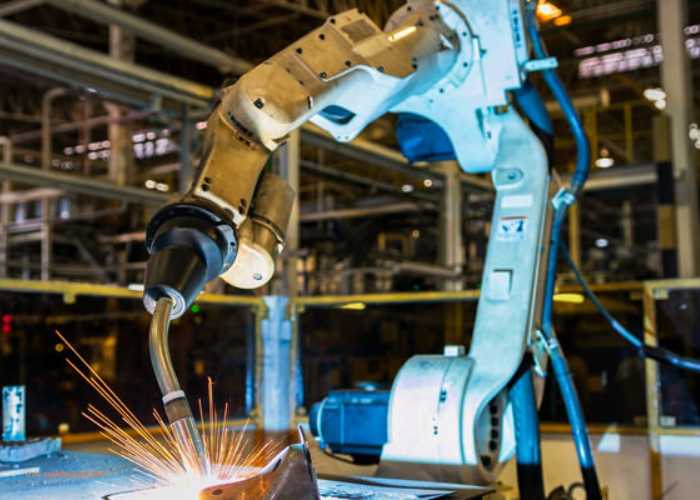In the ever-evolving landscape of global industries, the impact of advanced technology has become increasingly profound. The integration of cutting-edge technologies is not merely a trend but a transformative force reshaping sectors from manufacturing and healthcare to finance and entertainment. This article delves into how advanced tech is revolutionizing industries, highlighting key advancements and their implications for future growth.
The Technological Paradigm Shift
The 21st century has ushered in an unprecedented era of technological innovation. Technologies such as artificial intelligence (AI), blockchain, the Internet of Things (IoT), and advanced robotics are at the forefront of this transformation. These technologies are not only enhancing operational efficiencies but are also redefining traditional business models and creating new market opportunities.
Artificial Intelligence (AI) and Machine Learning
AI and machine learning (ML) are arguably the most transformative technologies of our time. By leveraging algorithms and data analytics, AI systems can learn from patterns and make decisions with minimal human intervention. In industries like healthcare, AI is revolutionizing diagnostics and personalized medicine. AI-powered tools can analyze medical images with higher accuracy than human radiologists, enabling early detection of diseases such as cancer.
In the finance sector, AI algorithms are enhancing fraud detection and risk management. They analyze transaction patterns in real-time to identify anomalies, thus preventing fraudulent activities and protecting financial assets. Moreover, AI-driven chatbots and virtual assistants are improving customer service by providing instant, personalized responses to queries.
Blockchain Technology
Blockchain technology, known for its role in cryptocurrency transactions, extends beyond digital currencies. Its decentralized nature ensures transparency and security, making it a game-changer in industries requiring robust record-keeping. In supply chain management, blockchain enhances traceability and reduces fraud by providing an immutable ledger of transactions.
For instance, in the food industry, blockchain can track the journey of products from farm to table, ensuring quality and authenticity. This traceability is crucial in managing recalls and ensuring consumer trust. Similarly, in real estate, blockchain facilitates transparent property transactions, reducing paperwork and accelerating the buying and selling processes.
The Internet of Things (IoT)
IoT refers to the network of interconnected devices that communicate and share data with each other. This technology is transforming industries by enabling real-time monitoring and automation. In manufacturing, IoT sensors monitor equipment performance and predict maintenance needs, minimizing downtime and improving productivity.
Smart cities are another notable application of IoT. Connected infrastructure systems, such as smart traffic lights and waste management systems, enhance urban living by optimizing resource usage and reducing congestion. IoT also plays a crucial role in agriculture, where sensors monitor soil conditions and crop health, leading to more efficient and sustainable farming practices.
Advanced Robotics
Robotics technology is advancing rapidly, with robots becoming more versatile and capable. In manufacturing, robots are performing tasks ranging from assembly and welding to painting and quality inspection. These robots increase precision and efficiency while reducing the risk of human error and workplace injuries.
The healthcare industry benefits from robotic surgery systems, which allow surgeons to perform complex procedures with greater accuracy and minimal invasiveness. Additionally, robots are being used in elderly care and rehabilitation, providing assistance and improving the quality of life for individuals with mobility challenges.
Implications for Future Growth
The integration of advanced technologies is not without challenges. Issues related to data privacy, cybersecurity, and the displacement of jobs due to automation need to be addressed to ensure a smooth transition. However, the potential benefits far outweigh the drawbacks, driving innovation and creating new opportunities.
Economic Growth and Job Creation
Advanced technologies are fostering economic growth by creating new industries and job opportunities. For instance, the rise of AI and data analytics has led to a demand for skilled professionals in fields such as data science, machine learning engineering, and cybersecurity. Moreover, the proliferation of startups focused on tech innovations is stimulating entrepreneurial activity and investment.
Enhanced Quality of Life
The advancements in technology are improving the quality of life across various domains. In healthcare, technologies like AI and robotics are providing better diagnosis, treatment, and patient care. In everyday life, smart home devices and wearable technologies are enhancing convenience and personal well-being.
Sustainability and Environmental Impact
Technological advancements also play a crucial role in promoting sustainability. IoT and AI are optimizing energy consumption and reducing waste in industrial processes. Renewable energy technologies, such as solar and wind power, are becoming more efficient due to innovations in materials and engineering.
Conclusion
The revolutionizing impact of advanced technologies on industries is both profound and far-reaching. As AI, blockchain, IoT, and robotics continue to evolve, they will drive further transformation and innovation across various sectors. The benefits of these technologies, from improved operational efficiency to enhanced quality of life, are immense. While challenges exist, the potential for growth and advancement is boundless. Embracing these technological advancements will not only foster economic development but also create a more connected, efficient, and sustainable world.

